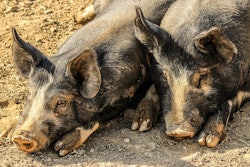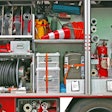A $160,000 grant awarded to Penn State's College of Agricultural Sciences will support research aimed at reducing the potential for injury and death due to grain bin entrapment, reports Penn State News.
The Northeast Center for Occupational Health and Safety in Agriculture, Forestry and Fishing has green-lighted funding for the three-year project, which will focus on improving mechanisms for safe grain bin entry systems, anchors and apparatus based on new recommendations. The project also will assess operators' use of safety guidelines and practices.
"A moving five-year average of 29 grain bin entrapments occur every year in the U.S., and approximately half result in a fatality," says principal investigator Michael Pate, Nationwide Insurance Associate Professor of Agricultural Safety and Health in the Department of Agricultural and Biological Engineering. "This is a serious issue for our farming communities."
He explained that an increase in growers' interest in storing grain — for economic and efficiency purposes — has increased the risk of incidents involving grain bins and silos. While there are several hazards associated with grain handling systems, such as respiratory issues, fires and noise levels, the most life threatening is entrapment or engulfment during loading, transportation or unloading of grain.
Pate's study will use a simulation design tool to test various scenarios, looking at grain bin design, access, anchor-point systems, and harness and safety apparatus use, among other factors, with the goal of retrofitting older, on-farm grain bins to enhance safety. He plans to survey operators on their interest in making upgrades and to learn what concerns and barriers they might face in improving grain bin entry systems.
Another area of study will involve focus groups, workshops and on-site visits to assess workers' knowledge and use of safety standards, and other related industry topics. Identified information gaps will be addressed through further education.
More resources related to farm safety — including articles, workshops, online education and publications — are available on the Penn State Extension website.

















